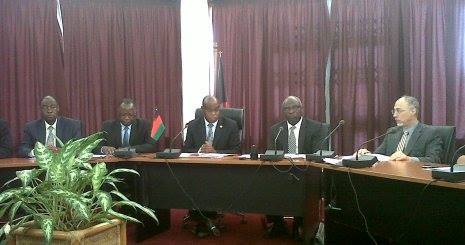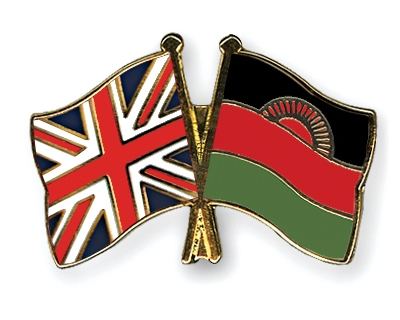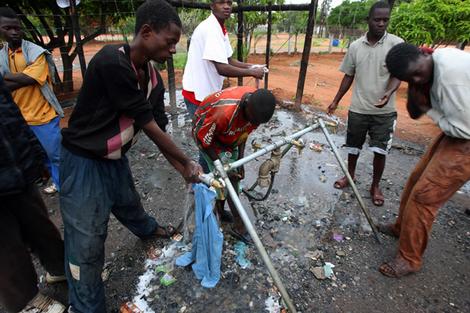Press Release No. 13/458
November 20, 2013
A team from the International Monetary Fund (IMF), led by Mr. Tsidi Tsikata, visited Lilongwe from November 5 to 20, 2013, to conduct discussions for the third and fourth reviews under Malawi’s Extended Credit Facility (ECF) arrangement.
1 The mission met Her Excellency President Joyce Banda, Minister of Finance Maxwell Mkwezalamba, Governor Charles Chuka (Reserve Bank of Malawi), Chief Secretary Hawa Ndilowe (Office of the President and Cabinet), Secretary to the Treasury Newby Kumwembe, Attorney General Anthony Kamanga, other senior government and RBM officials, as well as development partners, and representatives of civil society and the private sector.
The mission expresses its gratitude for the constructive spirit in which discussions with the authorities and all stakeholders were held. At the end of the mission, Mr. Tsikata issued the following statement:
“The policy reforms initiated in May 2012 have produced positive results. The introduction of a flexible exchange rate has made foreign currency readily available, allowing the clearing of private sector foreign arrears and the re-establishment of external credit lines. In parallel, the automatic adjustment mechanism for prices of petroleum products eliminated costly subsidies and facilitated a steady supply of fuel to the market. As a result, capacity utilization has risen sharply, contributing to a broad-based expansion in economic activity. Tight monetary and fiscal policies supported the adjustment and with the onset of foreign exchange inflows at the beginning of the tobacco season, the RBM was able to increase its international reserves significantly. Performance under the ECF-supported program was broadly satisfactory, with most quantitative targets met.
“However, recent revelations that substantial amounts of public funds have been misappropriated through fraudulent transactions using the government’s financial management system, introduced considerable uncertainty to the economic outlook. Aside from the direct loss through theft, external financial assistance to the budget was placed at risk. Development partners became reluctant to disburse funds into government systems they viewed as insecure. With fiscal buffers already weakened by excessive borrowing in the first quarter of FY2013/14, and with an emerging large fiscal gap, the IMF decided to delay completion of the third ECF review until the fiscal situation could be clarified and necessary corrective measures put in place.
“The main purpose of the current mission, therefore, was to reassess the assumptions underlying the program and to agree remedial measures to address the governance weaknesses revealed by the massive fraud and also to reverse the fiscal slippage. Towards this end, the mission held extensive discussions with the authorities and Malawi’s development partners to determine the resource envelope for the remainder of this fiscal year. It also reviewed net resources available from all sources, including through domestic revenue generation, expenditure savings, and domestic borrowing.
“The mission views the Action Plan recently adopted by government and the Extraordinary Performance Assessment Framework (soon to be agreed between government and the budget support donors) as appropriate vehicles to initiate the process of normalizing relations between government and development partners. These closely related frameworks contain strong measures aimed at repairing public fiscal systems, recovering stolen assets, and providing accountability.
“Preliminary indications are that full and vigorous implementation of these remedial measures will lead to the return of some budget support, but still leave a sizeable fiscal gap. With fiscal space constrained, recourse to domestic borrowing is sharply limited by the need to prevent a resurgence of inflation and to preserve international reserve levels. Consequently, most of the remaining gap will need to be filled through expenditure compression. In this process, it will be important to ensure to the extent possible that cuts are designed in a way that preserve social spending so that the burden of adjustment does not fall on the most vulnerable members of society.
“The mission welcomes the recent announcement by the Minister of Finance of reductions in the travel budget and in other lower priority expenditure items. However, given the relatively small share of discretionary spending in the budget, and the size of the necessary cuts, some postponement of domestically financed development projects will also be required.
“The mission supports the RBM’s recent public statement announcing its response to the delay in aid disbursements. We welcome RBM’s commitment to tighten monetary policy in order to preserve international reserves and dampen inflationary pressures.
“The mission will continue discussions with the authorities over the coming weeks on a few outstanding issues mainly related to budget execution. Once these are concluded, the mission expects to be in a position to recommend to the IMF Executive Board the completion of the third and fourth reviews under the ECF arrangement. Completion of these reviews will enable Malawi to receive a disbursement of SDR 13 million (about US$20 million) from the IMF.”
1 The Extended Credit Facility (ECF) has replaced the Poverty Reduction and Growth Facility (PRGF) as the Fund’s main tool for medium-term financial support to low-income countries by providing a higher level of access to financing, more concessional terms, enhanced flexibility in program design features, and more focused streamlined conditionality. Financing under the ECF currently carries a zero interest rate, with a grace period of 5½ years, and a final maturity of 10 years. The Fund reviews the level of interest rates for all concessional facilities every two years.





No comments! Be the first commenter?